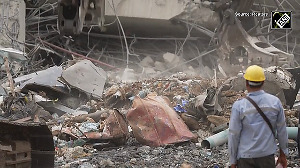Seeking China's backing for a permanent United Nations Security Council seat for India, External Affairs Minister S M Krishna on Tuesday called on Beijing to 'review' its policies on UN reforms to 'welcome' its neighbour to the core group of the world body.
"Indeed, even on the complex issue of UN reforms, it is time for China to review previously held positions and welcome the presence of, in the Security Council, a nation with which it has much in common," Krishna said while speaking on the topic 'India and China in the 21st century world' at a prominent think-tank in Beijing.
He said the interests of India and China converged on several issues, including climate change and world trade, and the two nations could boost each other through active cooperation.
"As developing societies, our convergence is manifest on issues like climate change and global trade rules. Given their shared interest in creating a more contemporary order, the two counties can advance their respective interest much better through active cooperation," he said.
China, a close ally of Pakistan, has been saying that it supports India's aspirations to play an important role at the UN, but wants an overall reform of the world body. China has also not backed Japan, the other Asian contender for a permanent UNSC seat.
Krishna, who began his four-day visit to China on Monday night, was expected to take up the issue during his talks with Chinese Foreign Minister Yang Jiechi and Premier Wen Jiabao on Wednesday. In his address and later in the interaction with the media, Krishna presented an upbeat picture of the Sino-Indian ties, saying that bilateral issues between the two countries are 'under total control' and the two countries have evolved a mechanism to solve complex issues like boundary demarcation.
Counseling patience to resolve the border issue, he said, "We have agreed upon a mechanism in order to find a mutually acceptable solution to this complex problem".
The special representatives of the two countries have had 13 meetings so far. "It is going to be a time consuming affair and one has to be patient to deal with it. The special representatives are aware of their responsibilities and we hope a mutually acceptable solution can be arrived at," he said.






 © 2025
© 2025